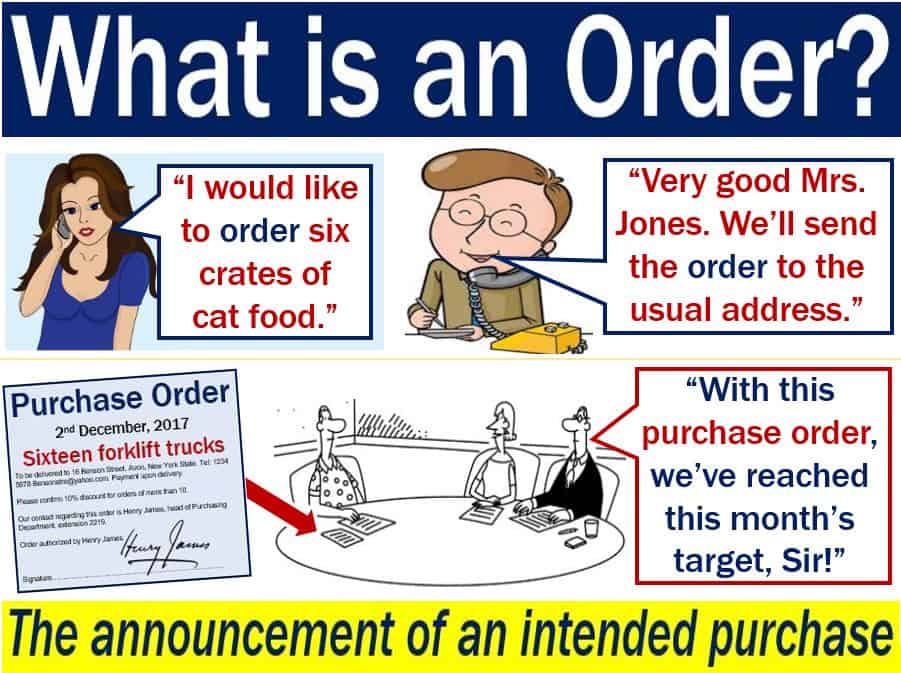An order can mean the announcement of an intended purchase, i.e., a request to buy something. A bank check or draft in which the issuer instructs the bank to pay somebody is an order. Orders may also refer to authoritative commands, directions, or mandates that courts issue. If you tell somebody what to do, you are giving them orders. In other words, when you give orders you give commands.
The verb ‘to order‘ can mean to tell somebody what to do, or to buy something. “I went online and ordered some printer toner” means I bought some printer toner on the Internet.
The term ‘law and order‘ refers to the rules and regulations of a country. It also includes the strict control of crime and the prevention of violence. In other words, the enforcement of those rules and regulations.
This article focuses on the business and finance meanings of ‘order.’
Order – in business and commerce
Orders are expressions of intentions to purchase things. They may refer to products or services.
The order becomes a contract between the purchaser and the seller. The purchaser commits to receive something from the seller and to pay for it.
A company’s number one objective is to get orders. In other words, to boost sales.

Spoken orders
In a restaurant, we utter our orders verbally. When I ask a waiter to bring me, for example, a steak and salad, I make the request verbally. In other words, we tell waiters what we want; we do not put it in writing.
We do the same in any retail premises, i.e., shops. When I take my shopping trolley to the check-out counter, it is an implied intent to purchase things.
Written orders
Orders in writing are common in B2B situations. B2B stands for business-to-business. In other words, when one company buys something from another company.
We commonly refer to orders in writing as purchase orders. We might send a purchase order by email, fax, or post. In fact, when buyers are at the sellers’ premises, they may deliver their purchase orders by hand.
When I buy something from a retailer online, I fill in a form and then give them my card details for payment. I do all this in writing, i.e., I type the information using my keyboard. Therefore, online orders are written orders.
Work order
A work order is an authorization in writing for a firm, team of people, or person to complete a job. The work may be to carry out repairs or maintenance.
Most work orders explain what the issues or problems are and how to fix them. They also include a timescale and a list of tools and equipment the workers will use. They also provide technicians with instructions on how to carry out the work.
Work orders contain the following:
- The name of whoever is requesting the work.
- The name of the person or body that is authorizing the work.
- The people who will carry out the work.
- Details of the task at hand.
- A deadline. In other words, a completion date.
- Where the work will take place.
- How the work will be completed.
Order management refers to dealing with orders, right from when customers first place them until they receive their order.
Compound words
Here are some compound words made using the term ‘order’ as the root word:
- Order-Form: A form used for making an order.
- Preorder: To order something before it’s available.
- Reorder: To order something again.
- Disorder: A state of confusion or mess.
- Suborder: A division within an order, especially in classifications of animals or plants.
- Out-of-Order: Not working properly or not in working condition.
- Orderly: Arranged or organized in a proper or systematic way.
- Mail-Order: A method of buying goods where the buyer selects and pays for products through mail or online, and then the products are delivered.
- Backorder: An order for a product that is temporarily out of stock and will be shipped later.
- Orderbook: A list or record of all the orders a company receives.
- Stop-Order: An order, especially a stock trade, that becomes executable once a set price has been reached.
- Purchase Order: A document between a supplier and a buyer that confirms a purchase.
- Standing Order: An instruction to a bank to pay a set amount at regular intervals.
- Bordereau: A detailed note, list, or memorandum, especially one providing a tally of a dealer’s short sales and the securities available for use in reducing that position.
- Borderer: One who lives on or near a border.
- Borderland: The district or region near a boundary line; the frontier.
- Law and Order: A situation in which the laws of a country are being obeyed, especially when the police or army are used to make certain of this.
- Orderliness: The quality of being methodical and well-organized.
- Misorder: To order or arrange wrongly; to misarrange.
- Short-Order: Relating to the preparation of food that can be cooked very quickly.
‘Order’ in other languages
Here is the word ‘order’,with its business meaning, i.e., when it refers to an announcement of an intended purchase, in some other languages:
- Pedido (Spanish)
- Commande (French)
- Bestellung (German)
- Заказ (Russian)
- Ordine (Italian)
- 注文 (Japanese)
- 주문 (Korean)
- 订单 (Chinese)
- Encomenda (Portuguese)
- طلب (Arabic)
- Замовлення (Ukrainian)
- Pesanan (Indonesian)
- Sipariş (Turkish)
- Заказ (Kazakh)
- طلبية (Urdu)
- सिपारिस (Hindi)
- অর্ডার (Bengali)
- આદેશ (Gujarati)
- ऑर्डर (Marathi)
- ਆਰਡਰ (Punjabi)
